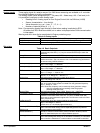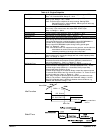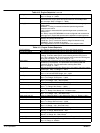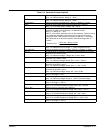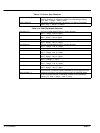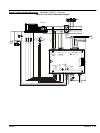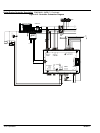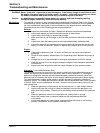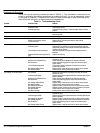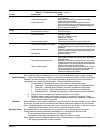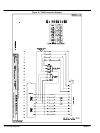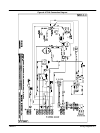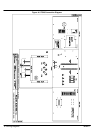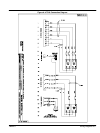
5-2 Troubleshooting and Maintenance MN2417
Problems and Solutions
Some of the more common problems are listed in Table 5-1. This information is intended to be a
check or verification that simple causes can be located and fixed. It is not an exhaustive “how to”
for all types of problems. Procedures that require in depth knowledge or skills (like flashing the
field) should be referred to an authorized service department.
Table 5-1 Troubleshooting Guide
Problem Possible Cause Remedy
Engine will not start
No fuel.
Restricted air flow.
Damaged glow plug
Check that fuel valves are ON. Check fuel level in fuel tank.
Check/replace air filter.
Check/replace glow plug(s). Check that engine switch is in Start
position.
Engine will not crank Dead battery. Remove battery and trickle charge or replace with new battery.
Never Jump Start.
Engine starts but will not run smoothly Fuel or ignition problem Refer to engine manual.
Engine overheats Excessive load
Debris or dirt buildup on engine
Low Coolant Level
Remove one or more electrical loads.
Remove debris. Clean engine surfaces to allow cooling.
Replenish coolant
Output voltage varies Irregular speed
Fluctuating speed
Loose terminal or load connections
Defective alternator bearing (uneven air
gap)
Check engine for malfunction or load for fluctuation
Stabilize load. The addition of a lamp load (resistance load) may
compensate partially for load changes caused by intermittent motor
operation. Do not overload.
Verify all connections are proper and check tighness torque of
terminals.
Replace worn bearing
Low Voltage (0−15 VAC output) Bad Voltmeter
Bad/Open Circuit Breaker/Fuse
Bad Connection
Loss of Residual Magnetism
Bad Voltage Selector Switch
Bad Stator Windings
Measure the voltage across the voltage meter with an accurate
voltmeter to verify.
Check continuity across Breaker/Fuse. Replace if defective.
Check wiring including grounds, crimps and connection points.
Repair defects.
The generator needs to be flashed. Contact service center to
perform this procedure.
Replace switch, contact service center to perform this procedure.
Contact service center to perform this procedure.
Low Voltage (15−20 VAC output) Bad Voltmeter
Incorrect Engine Speed
Bad/Open Circuit Breaker/Fuse
Bad Connection
Bad Voltage Selector Switch
Bad Stator Windings
Bad Voltage Adj. Rheostat
Bad Voltage Regulator
Bad Rotor Diodes
Bad Rotor Windings
Measure the voltage across the voltage meter with an accurate
voltmeter to verify.
Remove electrical load, output should be 61−62 Hertz adjust engine
speed if necessary.
Check continuity across Breaker/Fuse. Replace if defective.
Check wiring including grounds, crimps and connection points.
Repair defects.
Replace switch, contact service center to perform this procedure.
Contact service center to perform this procedure.
Replace rheostat, contact service center to perform this procedure.
Replace regulator, contact service center to perform this procedure.
Contact service center to perform this procedure.
Contact service center to perform this procedure.
Incorrect voltage output Bad Voltmeter
Incorrect Engine Speed
Bad Voltage Adj. Rheostat
Bad Voltage Regulator
Bad Connection
Bad Voltage Selector Switch
Measure the voltage across the voltage meter with an accurate
voltmeter to verify.
Remove electrical load, output should be 61−62 Hertz adjust engine
speed if necessary.
Replace rheostat, contact service center to perform this procedure.
Replace regulator, contact service center to perform this procedure.
Check wiring including grounds, crimps and connection points.
Repair defects.
Replace switch, contact service center to perform this procedure.
High output voltage Excessive speed Check engine for malfunction



